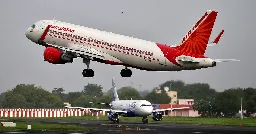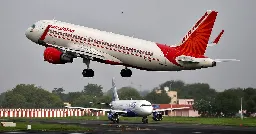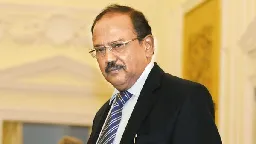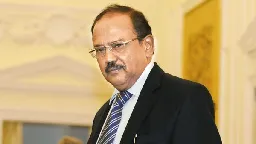Record demand from India sharply increased Airbus orders in June to leave the European planemaker with 1,044 net orders in the first half of the year, data showed on Friday.

Record demand from India sharply increased Airbus orders in June to leave the European planemaker with 1,044 net orders in the first half of the year, data showed on Friday.

The Indian government demanded legal prosecution or deportation of these extremist groups.

cross-posted from: https://lemmy.run/post/30611
> > > New Delhi: In the India-UK Strategic Dialogue that took place in Delhi on Friday, India urged the UK to tackle extremists threatening Indian diplomats. > > Indian National Security Adviser (NSA) Ajit Doval and his UK counterpart Tim Barrow led the talks, where India aired its grievances about extremist factions attacking Indian diplomats. The Indian government demanded legal prosecution or deportation of these groups. > > These requests come in the wake of attacks on Indian embassies overseas by pro-Khalistan extremists in March this year. The Indian High Commission in London was also a target, leading to a diplomatic dispute between India and the UK regarding the security provided to Indian diplomats. In a move to address the Khalistan extremism, India hosted Matthew Rycroft, the UK Home Department's senior official, this year. > > The two sides also discussed counter-terrorism, counter-terror financing, use of the internet for terrorism purposes, illicit drug trafficking and counter-radicalisation. > > The two nations are also considering a collaborative agreement similar to India's partnership with the US on critical and emerging technologies such as semiconductors, artificial intelligence, and quantum computing. This agreement aims to connect Indian businesses with UK-based leading-edge research facilities focusing on 5G and other pivotal technologies, and facilitating easier movement of research talent between the countries. > > The technology partnership was given further impetus after the Indian Science Minister, Jitendra Singh, visited London in April. Both nations inked an agreement to strengthen the ties between their scientific communities, and to allocate funds for research in artificial intelligence, machine learning, and bio-imaging. > > The NSAs also deliberated on wider regional and international issues during their encounter.
The Indian government demanded legal prosecution or deportation of these extremist groups.

New Delhi: In the India-UK Strategic Dialogue that took place in Delhi on Friday, India urged the UK to tackle extremists threatening Indian diplomats.
Indian National Security Adviser (NSA) Ajit Doval and his UK counterpart Tim Barrow led the talks, where India aired its grievances about extremist factions attacking Indian diplomats. The Indian government demanded legal prosecution or deportation of these groups.
These requests come in the wake of attacks on Indian embassies overseas by pro-Khalistan extremists in March this year. The Indian High Commission in London was also a target, leading to a diplomatic dispute between India and the UK regarding the security provided to Indian diplomats. In a move to address the Khalistan extremism, India hosted Matthew Rycroft, the UK Home Department's senior official, this year.
The two sides also discussed counter-terrorism, counter-terror financing, use of the internet for terrorism purposes, illicit drug trafficking and counter-radicalisation.
The two nations are also considering a collaborative agreement similar to India's partnership with the US on critical and emerging technologies such as semiconductors, artificial intelligence, and quantum computing. This agreement aims to connect Indian businesses with UK-based leading-edge research facilities focusing on 5G and other pivotal technologies, and facilitating easier movement of research talent between the countries.
The technology partnership was given further impetus after the Indian Science Minister, Jitendra Singh, visited London in April. Both nations inked an agreement to strengthen the ties between their scientific communities, and to allocate funds for research in artificial intelligence, machine learning, and bio-imaging.
The NSAs also deliberated on wider regional and international issues during their encounter.